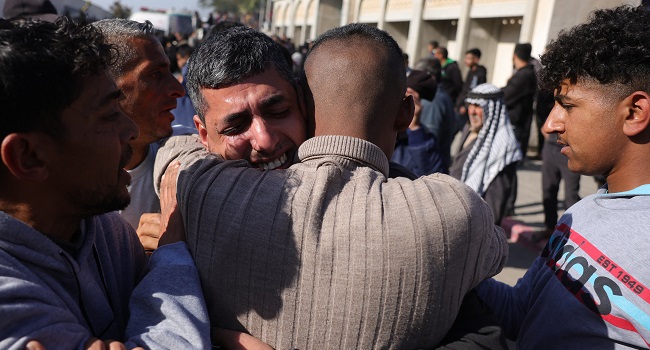Palestinian militants released three Israeli hostages on Saturday in exchange for hundreds of Palestinian inmates freed by Israel, completing the latest prisoner swap despite concerns that the Gaza truce deal was on the verge of collapse.
An AFP journalist witnessed masked Hamas gunmen leading the hostages onto a stage before a crowd in Khan Yunis, southern Gaza. The hostages were made to speak into a microphone before being handed over to the Red Cross and returned to Israeli territory.
Clutching gift bags from their captors and certificates marking the end of their captivity, the three men, flanked by fighters, urged the continuation of further hostage exchanges under the ceasefire agreement.
Shortly after, a bus carrying Palestinian prisoners departed Israel’s Ofer Prison and was welcomed by a cheering crowd in Ramallah, an AFP journalist reported. More buses transported inmates from a prison in the Negev desert to the Gaza Strip.
Sixth Swap Under Truce
This was the sixth prisoner exchange since the ceasefire took effect on 19 January. Hamas had earlier threatened to halt hostage releases, accusing Israel of violations, while Israel warned of resuming military action if the releases stopped.
The three freed hostages—Israeli-American Sagui Dekel-Chen, Israeli-Russian Sasha Trupanov, and Israeli-Argentine Yair Horn—had been held by militants since Hamas’s attack on Israel on 7 October 2023, which triggered the war 16 months ago.
Their families and friends expressed relief and joy at their release. “Finally, Sasha can be with his loved ones and start anew,” Trupanov’s family said in a statement. Dekel-Chen’s wife, Avital, was heard on Israeli broadcaster Kan saying, “My breath has returned. He looks so handsome.”
Later in the day, hundreds of Palestinians released by Israel arrived in Khan Yunis, flashing victory signs and waving to a jubilant crowd, according to an AFP reporter.
Israel confirmed the release of 369 prisoners, including 333 Gazans detained during the war and 36 others serving life sentences. Among them, 24 were set for deportation under the truce terms.
Ceasefire at Risk
Despite fears that the deal could collapse, a Hamas official said on Friday that talks on a second phase of the ceasefire could begin early next week. Another source familiar with negotiations supported this timeline, suggesting discussions could outline steps towards a more lasting truce.
US Secretary of State Marco Rubio, whose country is a key Israeli ally and a mediator in the truce talks, was set to arrive in Israel late Saturday for discussions with Prime Minister Benjamin Netanyahu.
Meanwhile, the Hostages and Missing Families Forum, an Israeli campaign group, urged all parties to build on the momentum and finalise a “swift and responsible agreement” to free those still held in Gaza.
Anger Over Treatment of Hostages and Prisoners
A crowd in Tel Aviv gathered to watch the exchange live, carrying Israeli flags and placards with messages such as “Sorry and welcome back” and “Complete the ceasefire.”
A previous release last week sparked outrage after freed hostages appeared frail and emaciated, raising concerns about their conditions in captivity. At the same time, several Palestinian prisoners were hospitalised following their release, with the Red Crescent reporting that four more were transferred to hospital in the West Bank on Saturday.
Tensions over the ceasefire have been heightened by US President Donald Trump’s proposed plan to relocate Gaza’s population of over two million people to Egypt or Jordan. Arab nations have rejected the proposal, with Saudi Arabia set to host a summit on Thursday with leaders from Egypt, Jordan, Qatar, and the UAE to discuss the matter.
A joint statement from Christian church leaders in Jerusalem also insisted that Gazans “must not be forced into exile.”
Heavy Casualties on Both Sides
The Hamas-led attack on Israel on 7 October 2023 resulted in 1,211 deaths, mostly civilians, according to Israeli figures. Militants also took 251 hostages, of whom 70 remain in Gaza, including 35 that the Israeli military believes are dead.
Israel’s retaliatory offensive has since killed at least 48,264 people in Gaza, the majority of them civilians, according to the territory’s Hamas-run health ministry, whose figures are considered reliable by the United Nations.
Following Saturday’s release, Netanyahu’s office stated that Israel, with US support, was working to free the remaining hostages “as quickly as possible” but provided no further details.


